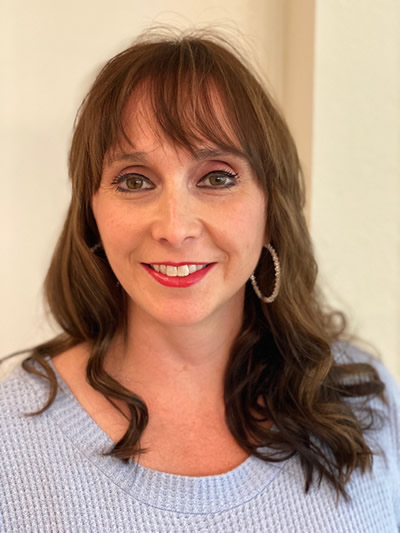PLANO, Texas — For more than a month, Audrey Smith had been dealing with the stress and uncertainty of the COVID-19 pandemic. Resuming yoga once again, it was Smith’s new form of stress relief. She never imagined that while stretching, she’d endure not one but two carotid artery dissections in her neck. That led to severe strokes and Smith’s harrowing fight for her life.

Audrey Smith
After receiving emergency treatment at Texas Health Presbyterian Hospital Plano, the 43-year-old mother of two is grateful for a successful recovery and the ability to share her journey with others.
“When she arrived in the emergency department, not only was she dealing with a terrible headache, her right hand was clumsy and numb,” said Thomas Madaelil, M.D., an interventional neuroradiologist on the medical staff at Texas Health Plano. “Alarm bells sounded, because that was very unusual for her.”
A magnetic resonance imaging (MRI) scan showed Smith had suffered two strokes, one on each side of her brain. An X-ray image of her internal carotid arteries — the two main arteries that run along the front of the brain and on the left and right side of the neck — determined both arteries were torn.
“It was beyond scary,” Smith said. “Within a few hours, I couldn’t say or spell my own name.”
While in the hospital, Smith had another severe stroke. “My speech became inaudible, and I developed a face droop on the right side,” she said. “Despite a horrible headache, I didn’t feel like I was on death’s door, but it turned out I was.”
The arterial dissection on her left side was worsening, leading to a complete closure.
Madaelil began an emergency reconstructive procedure. Using a specialized stent called a pipeline embolization device to open and expand the collapsed artery, Madaelil created a new pathway for oxygen-rich blood to travel to Smith’s brain, also allowing the damaged artery to heal in the process.
“Mrs. Smith was extremely lucky to be in the ICU when her health began to deteriorate,” Madaelil said. “Had she been at home or anywhere far from a critical care team, it could have been a very tragic outcome.”
After the four-hour procedure, Smith’s condition began to improve. She credits her post-procedure optimism to her ICU nurse, Cissy Hoffman.
“She updated my family constantly, and she made sure I received all of their voicemails and videos,” Smith said. “We viewed and listened to everything, together. We laughed and cried together, too. She was wonderful.”
Hoffman, a 26-year veteran in the nursing field, said the COVID-19 pandemic has been emotionally and spiritually painful for many patients, especially when they are separated from loved ones.
“She was terrified, and I didn’t think twice about providing her with the extra time and support she needed,” Hoffman said. “Separation anxiety can be detrimental to a patient’s healing process, and I feel blessed to be in the ICU to nurture patients in their times of need.”
Smith spent five days at Texas Health Plano before returning to her home in Addison. According to Madaelil, monitoring will continue for the dissection in her right carotid artery. Further imaging will be used to determine if Smith needs medical treatment or if the artery will simply heal on its own.
“She’ll probably need to refrain from yoga, because when the neck muscles are overextended, it can be very serious,” said Alla Al-Habib, M.D., a neurologist on the medical staff at Texas Health Plano. “Yoga is not a common cause for stroke, but I have seen it as the culprit for stroke in young, healthy individuals, as in Mrs. Smith’s case.”
During yoga, individuals sometimes perform extreme stretching maneuvers, which is good for the back and the limbs, but it can be extremely dangerous for the neck, Al-Habib said.
“Yoga is a great form of low-impact exercise, but there are more than 90 problematic poses people need to be mindful of. Seeking guidance from a qualified instructor so you don’t overexert or overextend any portion of your body is key.”
Al-Habib noted one of her patients suffered from carotid dissections and later developed locked-in syndrome — a rare neurological disorder that results in complete paralysis.
“Thankfully, Mrs. Smith’s condition had a different outcome,” Al-Habib said. “She worked extremely hard to make sure she was walking and talking before she left the hospital. But because her strokes were so severe, she needs speech therapy and physical rehab to facilitate a complete recovery.”
With the support of her husband and attending rehab five days a week, Smith says her motor skills are improving significantly.
“Normally, people just deal with a stroke affecting one side of the brain, but mine damaged both sides,” Smith said. “But thanks to the immediate and compassionate care I received, along with a supportive family, I have all the confidence and resources I need to continue my success story.”
Related News
About Texas Health Resources
Texas Health Resources is a faith-based, nonprofit health system that cares for more patients in North Texas than any other provider. With a service area that consists of 16 counties and more than 8 million people, the system is committed to providing quality, coordinated care through its Texas Health Physicians Group and 29 hospital locations under the banners of Texas Health Presbyterian, Texas Health Arlington Memorial, Texas Health Harris Methodist and Texas Health Huguley. Texas Health access points and services, ranging from acute-care hospitals and trauma centers to outpatient facilities and home health and preventive services, provide the full continuum of care for all stages of life. The system has more than 4,400 licensed hospital beds, 6,400 physicians with active staff privileges and nearly 29,000 employees. For more information about Texas Health, call 1-877-THR-WELL, or visit www.TexasHealth.org.
